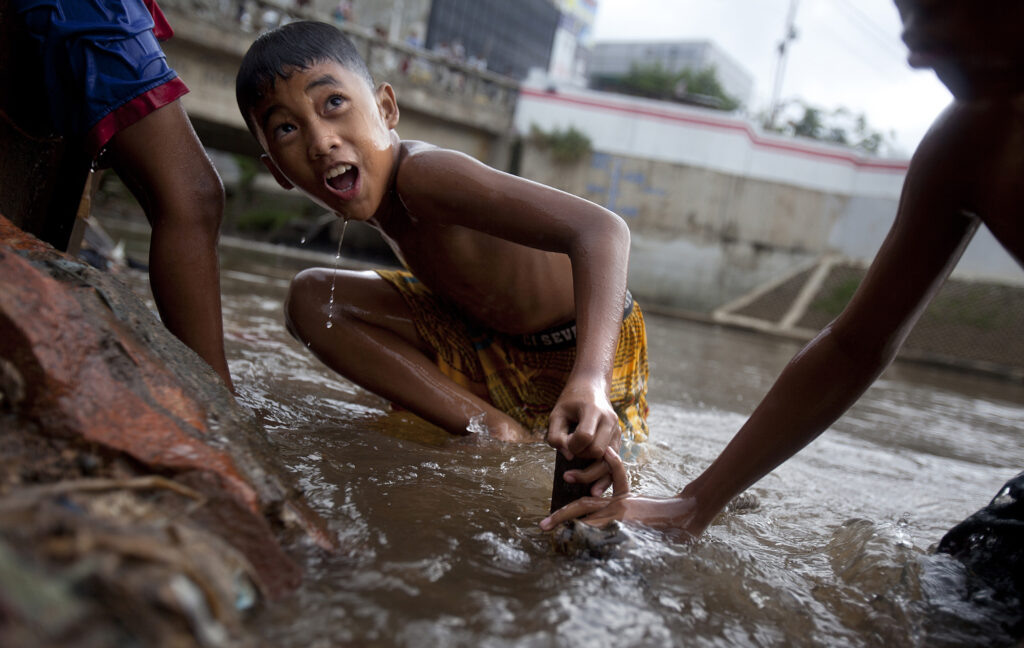
Moving out
While flood-resiliency efforts continue, Indonesia plans to abandon Jakarta as its capital.

While flood-resiliency efforts continue, Indonesia plans to abandon Jakarta as its capital.
Moving out is part of the Look back feature from the Spring 2023 issue of Michigan Engineer magazine.
Written By Ben Logan
For the fall 2016 issue, The Michigan Engineer magazine went to Jakarta, the capital city of Indonesia on Java Island, to spend time with Frank Sedlar (BSE CEE ’13, MSE ’15). The article “Out of the Flood” reported on his work as a Fulbright fellow with Peta Jakarta, addressing the complexities of seasonal flooding in the second largest settlement on earth.

Fast forward to today. The flooding issues in Jakarta are still deepening and Peta Jakarta has expanded to other cities in Indonesia under the new name Peta Bencana, which translates to “disaster map.” However, the biggest plot twist is that Jakarta won’t be the capital city much longer. In 2019, Indonesia’s parliament passed a bill to build a new capital city 1,250 miles northeast of Jakarta, called Nusantara. The flooding forecast for Jakarta’s future is so grim that the government wants to move somewhere safer.
Despite the change, it’s not like they’re going to scoop everyone up and bring them along. Officials have set aside 445,000 acres for the planned city. The state plans to fund about 20% of the estimated $32.5 billion cost; public-private partnerships and private investment will cover the remainder. As Al Jazeera reports, the government hopes its creation will promote sustainable growth beyond Java Island, the country’s most densely populated area, by becoming a hub that supports sectors such as pharmaceuticals, health and technology.
Meanwhile, Jakarta is experiencing land subsidence (sinking) of 1 to 15 cm per year. The sea level in Jakarta Bay increases as much as 0.57 cm per year, so a quarter of the city could be underwater by 2050. It’s unclear if Indonesia’s investment in flood mitigation resources and infrastructure in Jakarta will change with the capital relocation. Equally murky is the fate of the families who stay in place.

When Sedlar was in Jakarta, his team knew that they weren’t going to fix the flooding problem. Their focus was increasing resiliency and building better warning systems. And although the most at-risk communities are the poorest, most people still have smartphones and use social media. The founders of Peta Jakarta won a first-of-its-kind Twitter Data Grant that gave the team special privileges and behind-the-scenes access to Twitter’s geolocated data. This enabled them to leverage people’s Tweets to improve the flood modeling and warning system.
Sedlar spent a lot of time inside the communities along Jakarta’s flood-prone Ciliwung River. He was the only civil engineer on the Peta Jakarta team at the time and approached his work through an ethnographic lens. “They are the real flooding experts on the river,” he explained. “They know more about water conditions than any engineer in the city.”
Today, his career still centers around disaster modeling and analysis, working for an insurance company. “The biggest thing I’ve taken away from my time working with Peta Jakarta is an appreciation for why we’re ultimately developing these complex models,” says Sedlar, who now lives in Boston with his wife and two daughters. “It’s easy to get lost in the abstraction of this work. Having the perspective of what it’s like to experience yearly flooding and other natural disasters, and seeing what it does financially and emotionally to the communities I worked with in Jakarta, provides a solid reminder that this modeling is ultimately trying to make these communities more resilient to these natural catastrophes.
“I think it puts into perspective how large the engineering challenges related to the flooding are in Jakarta that it’s presumably less challenging to develop an entirely new city hundreds of miles away than it is to fix the flooding.
While hunger for an artificial intelligence that can think like a human remains unsated, AI continues to appear in our lives in smaller ways.
Not only can research participants control a prosthetic hand with their minds—now they can begin to “feel” it, too.
Progress continues for upcycling urine as a safe agricultural fertilizer.
Askanya Chocolates continues to churn out opportunity in an increasingly troubled Haiti.
Photos by Marcin Szczepanski